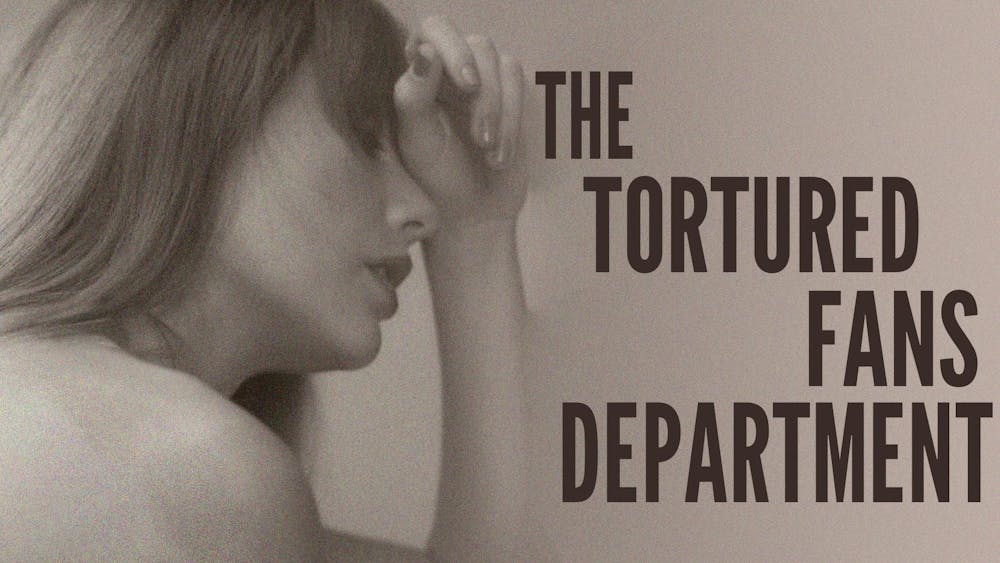Scene sat down with the cast and producers of Pasquerilla East Musical Company's (PEMCo.) annual mainstage, "Parade." Amid a hectic dress rehearsal, last-minute tweaks and the knowledge that the show's composer, Jason Robert Brown, is days away from arrival, producing duo Kelly Rice and Elizabeth Kuhn stepped away from their ensemble roles to sit in the audience and see their show in a new light.
Rice and Kuhn sat in the back of the audience answering questions while making mental notes (often out loud) about what still needs to be done ("His pants are still on stage,") and just how far it's come ("The tree looks amazing!").
"Parade" is the story of Leo Frank, a Jewish factory superintendent who is accused of raping and murdering one of his 13 year-old female employees. The media sensationalizes the situation, and Frank is eventually convicted. The story itself paints a very raw picture of the post-Confederate South, and the Anti-Semitism that arose during the trial.
Why did you decide to do "Parade?"
Producers: The director, Kevin Stein, came to us with the show. We knew we wanted to do something more serious than what PEMCo. has traditionally done. "The Producers" was hugely successful as a comedy, and we wanted to move the company in a different direction. The story is appealing in that it's true. It also has beautiful music and allows for large ensemble involvement.
What was the biggest challenge to producing this show?
Space was an issue — finding adequate space for a cast of 45 people to rehearse. We're no longer a permanent resident of Pasquerilla East. It was also a challenge to make sure we could find people to act and sing parts well. There aren't many minority performers that participate, even within FTT and the Opera. We needed to find someone for this student show, which we had to consider when we picked the show. It's also been a bit of a challenge organizing a visit from the composer, Jason Robert Brown.
That's right! The composer and lyricist Jason Robert Brown is coming to campus this weekend. How did you get him to come?
We went to his Web site and e-mailed his publicist. What better time to try and meet these people who you won't have access to at a later time? We've been planning this since October. We started a dialogue and had lots of options. When he comes, he either has to give a master class or have a concert. We figured a concert would allow the greater campus to participate, like people who do music outside of PEMCo., and not just our cast. So Sunday at 8 p.m. in the Annenberg Auditorium in the Snite Museum, Jason Robert Brown will be performing. Tickets are $2 with your "Parade" ticket stub, or $5 without. There's also a forum/talk back with him and Keith Byron Kirk, who was in the national touring cast and is now a graduate candidate at Northwestern.
How did you prepare before working on the show?
We did a lot of research beforehand. There is a PBS documentary called "The People Versus Leo Frank," which recently came out. We watched that as a cast. The script is very historically accurate, and there are a lot of lines that are direct quotes from the trial. All of the leads except the reporter were real people, and the reporter exists to act as a narrator, to tell the story.
Scene also got a chance to talk to the director and cast of "Parade."
Why did your company go with "Parade"?
Kevin Stein, director: "‘Parade' is hard because of it's music and story, and it's really affecting. We want to stretch the muscles of this company."
Is there a moment in the show when you get chills and just think, "Wow!"
Lucy Lavely, "Mrs. Phagan:""In the finale, when we co-a capella. The whole ensemble is on stage. You can feel the presence of every character on and off stage standing there as we sing the same anthem that begins the show. It's really eerie and invigorating, and at the same time so wonderful."
Joe Edmonds, "Leo Frank:" "The show's anchor and what in my mind redeems it from what some may see as complete morbidity is the resilient and blooming relationship between Leo and his wife, Lucille. I am lucky enough to act opposite Carolyn Sullivan, an actor who understands the importance of real connection onstage, and the scene of which I am most proud is in some ways no more than that — two people finally and fully connecting with each other, even in the direst situation imaginable."
What is the biggest challenge you have faced as a cast?
Edmonds: "Much of what happens in this show is emotionally draining to experience, both for the audience and especially for the performers who have to repeat it daily in rehearsals and in three straight performances. I left our first read-through of the entire script extremely shaken, even despite what I saw then as an inability to realize or relate to Leo's lengthy ordeal. Our cast has done a tremendous job of fleshing out the history on which our show is based, and as such there are certain ensemble scenes that just wreck me every time, that I couldn't emotionally bracket if I wanted to."
Matt Callanan, "Britt Craig:" "The hardest part was shaving my beard."
Stein: "The rehearsal schedule has been long and grueling, and it hasn't gone according to plan all the time. Our process has been to focus on the music first and learn that, and then focus on staging, then work on character. I was pushing for doing a lot of runs, and figuring out the flow of the show. It's so convoluted and it goes so fast that it was really important for the actors to understand the flow of the show.
Edmonds: "Also, playing Leo presents a number of unique difficulties. For one, he's a historical figure, which means that there's a wealth of information I can use for character development but also adds for me a certain pressure to ensure that my performance is in keeping with what this real human being may have been like. At the same time, this is a fictionalized account. The Frank case was an unbelievably complicated and drawn-out process that had to be trimmed down and streamlined to fit into a 2 1/2 hour show, and as such I've found it more helpful as an actor to focus on the individual circumstances of each scene than the minute details provided by history. And with a show as loaded as this one, even this limited focus provides more than enough to latch onto."
What will the average Notre Dame student get out of this show?
Kelly Rice, producer: "We're getting the opportunity to tell the real story of a history tragic miscarriage of justice. We didn't know about it ‘til we read the script. It's cool to present it in a new way."
Herman: "It's very entertaining. We won't beat you over the head. You will enjoy yourself. People at Notre Dame don't go to plays all the time. It's a good thing to do on the weekend … also, it's Valentine's Day. There's love making."
Stein: "It hits you in different ways. Lots of moments you're like, this is fun, and moment's you're like, this is intense. It's a grab bag of emotions. But also you'll go home and be like, that happened to some guy. Saying that out loud almost brings you to tears. It's enjoyable but powerful."













